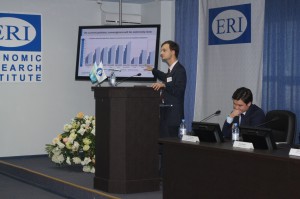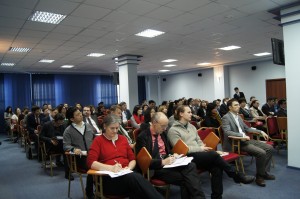 ASTANA – The European Bank for Reconstruction and Development (EBRD) presented its annual Transition Report in Astana on Jan. 30.
ASTANA – The European Bank for Reconstruction and Development (EBRD) presented its annual Transition Report in Astana on Jan. 30.
The report, entitled “2013 Transition Report: Stuck in Transition,” is the EBRD’s flagship publication and provides an annual update on the progress of reforms and economic developments across 30 countries from central Europe and Central Asia and the EBRD’s new focus region in the southern and eastern Mediterranean.
Attending the presentation was Senior Economist for Central Asia Agris Preimanis, who is engaging with governments, regulators and the private sector to formulate economic policies and structural reforms, including at the sectoral level, in Kazakhstan, Kyrgyzstan, Tajikistan, Turkmenistan and Uzbekistan. Preimanis is also overseeing the analysis of the economic environment and reforms in the region. Previously at EBRD, Preimanis was the senior economist responsible for the financial sector and private equity and venture capital sectors in Russia, Central Asia, Mongolia and the Baltic states, focusing on EBRD investments and developing EBRD’s activities in financial sector regulation and venture capital and innovation ecosystems. Before joining EBRD in 2010, he was the senior consultant for financial services and corporate finance at Oxera, a U.K.-based advisory firm.
Preimanis discussed some of the positive and negative aspects of Kazakhstan’s economic growth and that of neighbouring countries in an exclusive interview with The Astana Times.
“Against the backdrop of a very difficult external environment, the 6 percent growth in the Kazakh economy in 2013 looks very robust. It’s really on the back of strong investment growth and resilient consumption spending that Kazakhstan has been able to achieve these results. And going forward I see stable growth of about 5.5 percent for 2014,” he said.
According to Preimanis, inflation “slowed down to 4.8 percent in December 2013. In 2014, it will go up toward the National Bank’s range of 6 to 8 percent.”
Neighbouring gas- and oil-rich Turkmenistan and Azerbaijan are also experiencing strong economic growth.
“The growth in 2013 in Turkmenistan was stronger [than in Kazakhstan]. But a direct comparison of the drivers of growth and the reasons for differences in growth between these two countries needs to be done with caution, as Kazakhstan is much more developed, in terms of its economic institutions and the economy in general. Also, the income per capita is higher,” Preimanis explained.
Preimanis sees advantages and challenges ahead for Kazakhstan.
“I will give you two positives [in the Kazakh economy]. One is the green economy. A lot of progress is being made on legislation to facilitate growth in the green economy—it is a priority for the government and very concrete steps are being taken by the government. Steps are also being taken by the private sector and international financial institutions, including the EBRD,” he said.
“We are actively participating in the development of this area, where real investment and real money is going into developing sustainable energy sources, energy efficiency and the efficiency of waste management. That [growth of the green economy] is a significant positive.”
“Moving a bit off topic, every time I come to Kazakhstan, what surprises me is the potential the young people have here,” the economist said.
“That is from education. Effort is being put into creating education in the country that is of a very high standard as well as sending people abroad to study. I think it’s a critical part of developing Kazakhstan into a very strong country in the long term.”
All is not rosy on the horizon, however.
“[In terms of negatives] it is the financial sector, the banking sector—that is an obvious one. It has structural problems at the moment and it is a drag on the economy and makes it more difficult for the country to diversify its economy. The re-energised efforts to resolve those issues with the arrival of the new governor of National Bank will help. So I certainly hope that in the next 4-5 years, what I call now one of the bleakest problems for Kazakhstan will be on the road to being resolved and the sector will help develop a more balanced economy here,” he concluded.

